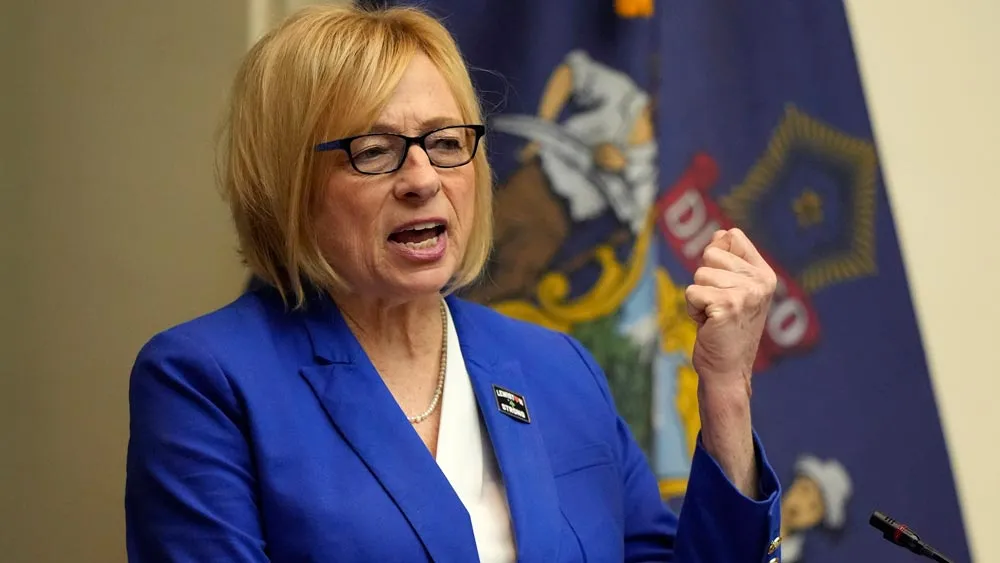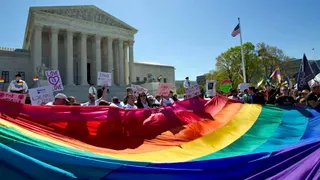March 9, 2021
Can Straight Actors Playing LGBTQ Roles Cause 'Disillusionment and Confusion'? Some Say Yes
Kevin Schattenkirk READ TIME: 3 MIN.
As the debate continues on who should or shouldn't play queer roles in film and TV, a new piece by Insider posits that straight cisgender actors playing LGBTQ roles adversely impact the wellbeing of LGBTQ people.
Pointing to James Corden's much-maligned performance in Ryan Murphy's "The Prom," Insider reiterates claims that the British actor traded in stereotypes of effeminate gay men. Corden's performance was a "caricature" and "borderline homophobic" because, among other things, "he had to leave his childhood before coming out as gay."
Admitting that "there aren't any studies on the topic," Insider provides an anecdotal discussion on the "disillusionment and confusion" that can arise from seeing straight cisgender actors playing LGBTQ roles. Dr. Matthew Kridel, a postdoctoral fellow specializing in LGBTQ psychology at Augusta University, cautions that straight cisgender actors "may reinforce the false idea that LGBTQ identity is a choice." Consequently, Kridel says, when those actors hang up their costumes at the end of the day, LGBTQ people are left with real-world struggles.
How actors research their characters is vital to a successful portrayal. But Dr. Christy Kane, a mental health specialist in Utah, contends that LGBTQ youth experience anxiety because of the disconnect between how they perceive themselves and how LGBTQ people are represented in entertainment.
"All humans fear misunderstanding and stereotyping, and such is compounded when Hollywood enlists those not of a certain designation to pretend and play as if they are," Kane said. "Yes, there can be interviews and research, but in truth, if they are not your shoes, no matter how much you try to wear them, they just will not fit."
Trashing Corden's performance has become a trope at this point, which even an avowed Corden-hater like James Greig contends. In a film so over-the-top, expecting authenticity from only Corden's character is far-fetched. But the problem with Corden's critics is how they don't appear to see the misogyny in deriding his feminized, "stereotypical" performance. Such not-all-gays-are-swishy attitudes are heteronormative.
Another issue at stake is how accessible LGBTQ roles are to LGBTQ actors, a point recently made by "It's a Sin" mastermind Russell T. Davies. Davies says the real problem is Hollywood's neglect in casting LGBTQ actors as leads across the board and not just in telling LGBTQ stories. Davies places the onus on straight cisgender actors to make space for their LGBTQ colleagues: "I think if you get offered a film in a gay role, you should turn it down, and you should take those production companies by the hand and say 'I've got a lot of clout, I've got a lot of people, come with me to raise money over here, and I will help you get a gay person into the leading roles.'"
Equally as important is the question of who gets to tell LGBTQ stories. After Scarlett Johansson came under fire for accepting a role as a transgender character and then responding poorly to the backlash, the actress issued a statement acknowledging a trans actor should play the part. Transgender actress Trace Lysette summed up the concern about the importance of LGBTQ people telling LGBTQ stories in tweets directed at Hollywood: "Not only do you play us and steal our narrative and our opportunity but you pat yourselves on the back with trophies and accolades for mimicking what we have lived."
"We need to recognize that art plays a role in how marginalized people are treated and viewed by society," Peppermint, the first transgender actor to originate a Broadway role told Vice in 2018. "A lot of the time, Hollywood makes these stories about queer, trans, and minority folks, and they get it wrong: there's offensive material, tragic storylines, one-dimensional, stereotypical characters with little depth."
Another consideration is when LGBTQ characters are painted either as tragic or predatorial figures. Insider points to serial killer Buffalo Bill in the 1991 film "Silence of the Lambs" as particularly harmful. The question of whether Corden's portrayal of Barry Glickman sinks to such levels seems trite by comparison.
Debate on the issue continues. Citing Timothée Chalamet's and Trevante Rhodes' characters in "Call Me By Your Name" and "Moonlight" as prime examples, Zack Sharf and Jude Dry contend, "It's almost reductive to say straight actors can't play gay characters because that implies an 'othering' of gay people, or that gay people are so fundamentally different than straight people that one could never play the other. I don't believe that to be true at all."
But Dr. Kane believes that more harm than good can come from straight cisgender actors playing LGBTQ roles, saying, "Everybody wants authenticity. I think the more authentic a character can be portrayed, the less negative impact there will be."
Kevin Schattenkirk is an ethnomusicologist and pop music aficionado.





